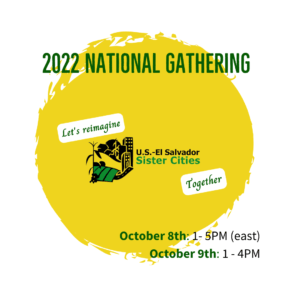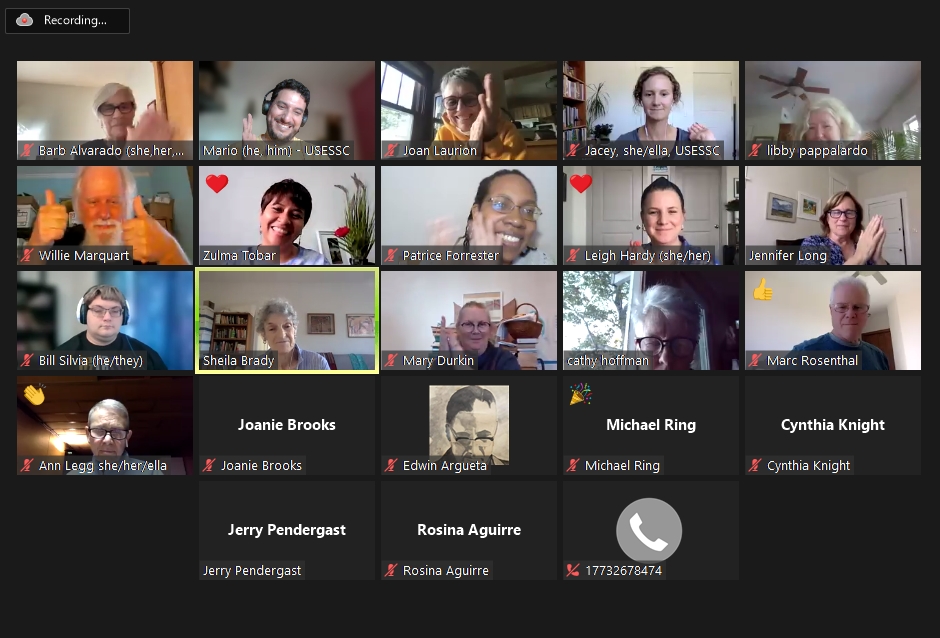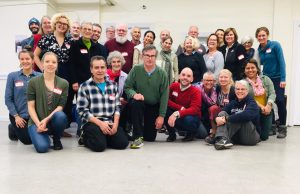Sister Cities
Report of our 2022 National Gathering
(EN ESPAÑOL ABAJO)
On October 8 and 9 our network held a virtual National Gathering for the third year in a row. This post aims to provide a short summary of the highlights from the weekend. If you want to get more into the weeds, you can read the full meeting minutes or watch the recording of the gathering on YouTube.
Day 1
Saturday kicked off with a guest presentation from popular educator and historian Diana Sierra Becerra. Sierra Becerra’s accomplishments are many, but we focused on viewing and discussing one of her projects: a video about the role of Radio Venceremos during the Salvadoran Civil War. We followed this viewing with a candid Q & A, covering themes such as the role of history in understanding current-day struggles, the past and present struggles of Salvadoran women, and organizing in difficult contexts. Sierra Becerra was kind enough to share many resources, which you can now find on our resource page.
This discussion then continued with a presentation from Gertrudis Mejía, Vice President of CRIPDES. Gertrudis began with an update of the deteriorating living conditions in El Salvador, all of which are exacerbated by policies of the Bukele administration. She then opened the floor to questions, and we covered a lot of ground. A couple of key themes that came up was that the current politics in El Salvador have continued to create division within communities and families. Fitting with the historic pattern of the CRIPDES-Sister Cities relationship, Gertrudis emphasized the ongoing struggle since the war and the need to continue denouncing human rights violations of the Bukele government. She also called for a broader communication between campaigns across the globe who are fighting for human rights.
After a state of the network address from USESSC Board President Michael Ring, the PopEd-Formación team presented a proposal for restructuring of the network. Essentially, this would entail a representative from each committee and working group participating in a “Sistering Council,” which would replace the current board structure. After questions and discussions in small groups, the proposal passed unanimously.
Day 2
Sunday began with a riveting discussion on starting a pupusa delivery service with an accompanying app as our next big fundraising idea.
We then got back to discussing our reimaging process, which, in addition to a restructuring of the board, includes bimonthly member meetings open to all members and potential new members. These meetings could range anywhere from a fundraising Spanish lesson, to a political analysis on current events in El Salvador. We hope this will serve as a space to recruit and retain new members.
Finally, we ended the day with an “Action Hour,” where we broke into two themed groups: US Policy and Sistering Council. The US Policy group discussed how to move toward becoming an anti-racist organization, history, and information on the Urgent Action Network. The Sistering Council group discussed potential challenges of the transition from the board to council and started to create a timeline of when we would like this change to be in place (sounds like early 2023!).
Thank you to all who attended the National Gathering weekend, and thank you to those catching up now with the notes, video, and this post! We’re excited to keep our work moving forward as we adjust to the current realities and challenges ahead.

El 8 y 9 de octubre nuestra red realizó la Asamblea Nacional virtual por tercer año consecutivo. Esta publicación tiene como objetivo proporcionar un breve resumen de los aspectos más destacados del fin de semana. Si desea obtener información más detallada, puede leer las actas completas de la reunión o ver la grabación de la reunión en YouTube (en inglés).
Día 1
El sábado comenzó con una presentación de la educadora popular e historiadora Diana Sierra Becerra. Los logros de Sierra Becerra son muchos, pero nos enfocamos en ver y discutir uno de sus proyectos: un video sobre el papel de Radio Venceremos durante la Guerra Civil Salvadoreña. Continuamos con una sesión de preguntas y respuestas, que cubrió temas como el papel de la historia en la comprensión de los desafíos actuales, las luchas pasadas y presentes de las mujeres salvadoreñas y la organización en contextos difíciles. Sierra Becerra tuvo la amabilidad de compartir muchos recursos, que ahora puede encontrar en nuestra página de recursos.
Esta discusión continuó luego con una presentación de Gertrudis Mejía, Vicepresidenta de CRIPDES. Gertrudis comenzó contándonos cómo se han deteriorado las condiciones de vida en El Salvador, todo lo cual se ve exacerbado por las políticas de la administración Bukele. Cuando llegó el momento de preguntas, cubrimos mucho terreno. Un par de temas clave que surgieron fue que la política actual en El Salvador ha seguido creando división dentro de las comunidades y las familias. En concordancia con el patrón histórico de la relación CRIPDES-Ciudades Hermanas, Gertrudis enfatizó la lucha permanente desde la guerra y la necesidad de seguir denunciando las violaciones a los derechos humanos por parte del gobierno de Bukele. También pidió una distribución más amplia de las campañas por los derechos humanos en todo el mundo.
Después de un discurso sobre el estado de la red del presidente de la junta de USESSC, Michael Ring, el equipo de Educación popular-Formación presentó una propuesta para la reestructuración de la red. Esencialmente, esto implicaría que un representante de cada comité y grupo de trabajo participe en un “Consejo”, que reemplazaría la estructura actual de junta directiva. Después de preguntas y discusiones en pequeños grupos, la propuesta fue aprobada por unanimidad.
Dia 2
El domingo comenzó con una discusión sobre cómo iniciar un servicio de entrega de pupusas a través una aplicación como nuestra próxima gran idea para recaudar fondos.
Luego volvimos a discutir nuestro proceso de reestructuración, que, además de cambios en la junta, incluye reuniones de miembros bimensuales abiertas a todos los miembros y posibles nuevos miembros. Estas reuniones pueden ser desde una lección de español para recaudar fondos hasta un análisis político sobre los acontecimientos actuales en El Salvador. Esperamos que esto sirva como un espacio para reclutar y retener nueva membresía.
Finalmente, terminamos el día con una “Hora de Acción”, donde nos dividimos en dos grupos temáticos: Política de EE. UU. y el nuevo Consejo. El grupo de Política de EE. UU. discutió cómo avanzar para convertirse en una organización antirracista, la historia y la información sobre la Red de Acción Urgente. El grupo del Consejo discutió los posibles desafíos al hacer la transición de la junta y comenzó a crear un cronograma de cuándo nos gustaría que este cambio se realice (¡Suena que a principios de 2023!).
¡Gracias a todos los que asistieron al fin de semana de la Asamblea Nacional y gracias a los que se pusieron al día ahora con las notas, el video y esta publicación! Nos entusiasma seguir avanzando en nuestro trabajo a medida que nos adaptamos a las realidades actuales y los desafíos que se avecinan.



